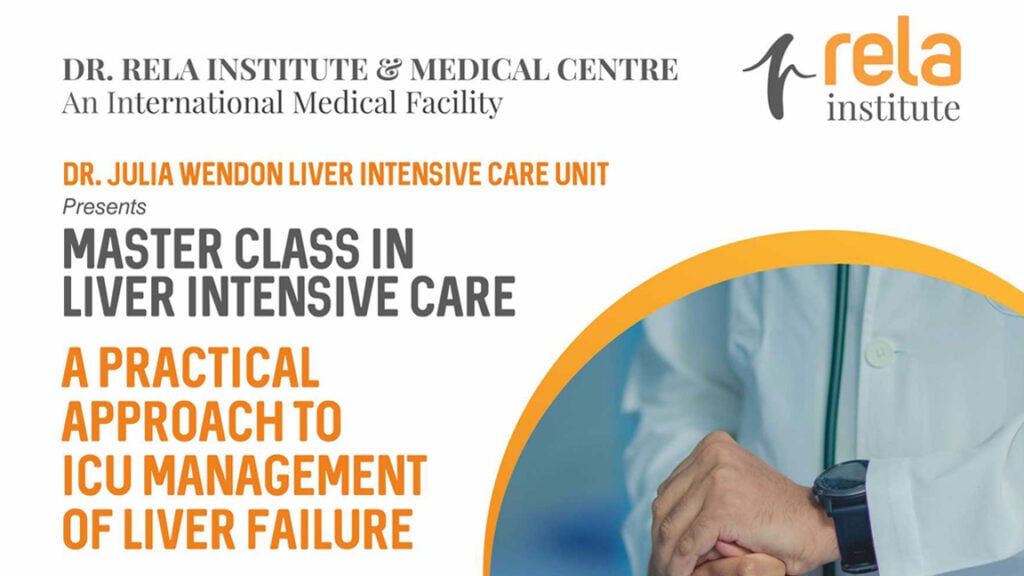Busy schedules and bustling lives tend to push our health down in our priority list. The liver bears the brunt of such a lifestyle and the rising instances of liver-related ailments are a testament to this phenomenon. Liver health is pivotal to lead a contented life making liver care and the treatment of liver-related illnesses an important aspect of medical care.
Read MoreBusy schedules and bustling lives tend to push our health down in our priority list. The liver bears the brunt of such a lifestyle and the rising instances of liver-related ailments are a testament to this phenomenon. Liver health is pivotal to lead a contented life making liver care and the treatment of liver-related illnesses an important aspect of medical care. Dr Rela’s Dr. Julia Wendon Liver Intensive Care Unit is one of the top hepatology divisions in the country and is equipped with state-of-the-art medical technology to provide care on par with international standards. Named after Prof. Julia Wendon, a pioneer in the field of liver critical care and our mentor; we seek to emulate her principles. We possess a 36-bed strong liver ICU and a 24-bed liver transplant ICU specially designed to provide 24/7 adult and pediatric liver care. Our intensive care units are backed by skilled medical professionals with extensive experience and a commitment to provide patients with the care that will ensure a high quality of life.
What does the liver do?
The liver is a cone-shaped organ that is situated just below the rib cage. It is located on the right side of the abdominal cavity and has a characteristic reddish-brown colour. The liver weighs around 1.5 kilograms but its functionality massively outweighs its smaller size. The liver plays an indispensable part in metabolism and detoxification.
Its functions include:
Diseases of the Liver
The liver is one of the most actively functioning organs of the human body and is integral to a host of biological activities. Therefore, liver health is vital to lead a high quality of life. There are numerous conditions that plague the liver These arise due to both genetic and environmental factors. Liver diseases can be broadly classified into 4 strata.
These include:
Infectious diseases
Certain pathogens cause inflammation of the liver that can have potentially serious consequences. The most common liver infection is viral hepatitis and it falls under three categories:
Liver Cancer
The liver is susceptible to cancer and it usually spreads to the liver rather than originating from there. There are no immediate symptoms of liver cancer but there are certain warning signs.
These include:
Liver cancer usually arises as a complication of diseases that affect the liver, primarily hepatitis infection and cirrhosis. Ensuring preventive care for these illnesses can drastically reduce the risk of cancer.
Drug & Alcohol Use
The liver is responsible for filtering out toxins in the blood. About 90% of consumed alcohol is processed by the liver. Naturally, increased consumption of alcohol and alcohol abuse leads to damage to the liver. This causes the formation of scars in the liver which ultimately replaces the healthier parts. The condition is termed Cirrhosis. It can also lead to fatty liver disease which involves the build-up of fat in the liver followed by inflammation. Drugs affect the liver by inciting the release of higher levels of enzymes which eventually leads to liver failure. The danger is doubled when certain drugs and alcohol are used simultaneously.
Inherited Diseases
Some people have a genetic predisposition to getting liver disease. Liver diseases that are hereditary in nature include:
Symptoms of Liver Diseases
Although the effects of liver diseases are not immediately perceivable, there are certain symptoms that can point to an underlying condition. Different types of the liver disease exhibit their own set of symptoms, but the following ones are common amongst the diseases that affect the liver:
Liver failure
Since the liver possesses a wide range of functionalities and is indispensable to daily function, evolution has given it the potential to regenerate. Up to a certain threshold, the liver is the only organ that can regenerate in the human body. However, once that critical point is passed, the damage is irreversible. This is known as liver failure.
Liver failure is a potentially fatal condition with falling into a coma or death being likely possibilities. Health professionals can try and stop the progression but at the end stage, the only possible recovery option is a liver transplant.
When to meet a doctor
The majority of liver diseases tend to cure by themselves and do not need professional help. However, certain conditions such as acute liver failure require immediate medical assistance as the risk of developing serious complications is quite high. The onset of diseases like acute liver failure tends to be instantaneous and fall under the category of emergency care. Therefore, meeting with a doctor instantly following the manifestation of symptoms is paramount.
The treatment protocols for hepatic diseases vary with the type of disorder but basic principles are often similar. Medical therapy, supportive care and transplants are often employed for more serious liver conditions. Although at early stages, lifestyle changes can ensure full recovery owing to the regenerative properties of the liver.
These include:
Diagnosis of Liver diseases
It is not practical to diagnose a liver disease on the basis of symptoms alone as they overlap with numerous other conditions. There are specific screening techniques that can be utilised to detect liver disease.
These include:
Acute liver failure is one of the most severe and life-threatening illnesses and requires intensive care. Dr. Rela Hospital is equipped with the latest technology to tackle the disease and our doctors are leading figures in liver treatment throughout the country. We have intensive care units that are dedicated exclusively to liver patients and our team is helmed by Professor Mohammed Rela whose extensive experience includes more than 4000 liver transplant surgeries.
Advanced & Upcoming treatment options
Dr. Rela Hospital seeks to incorporate novel and modern forms of treatment in order to treat liver diseases such as acute liver failure. We believe that our patients should be entitled to all the options of treatment. This is why Dr. Rela Hospital is one of the foremost hepatic treatment centres in the country.
An advanced and new treatment that has shown promise for countering acute liver failure is High-Volume Plasma Exchange or HVPE. This is particularly effective against autoimmune disorders which cause liver diseases. It involves the replacement of a certain percentage of blood plasma with fresh frozen blood plasma. This method of treatment is still at the early stage and has shown immense therapeutic potential with no adverse side effects.
Another emerging medical technology is the use of support devices that mimic liver function. These include artificial and bioartificial support systems. They perform detoxification similar to that of the liver. These support devices are still under trial and more data is needed to conclusively determine their efficacy.



